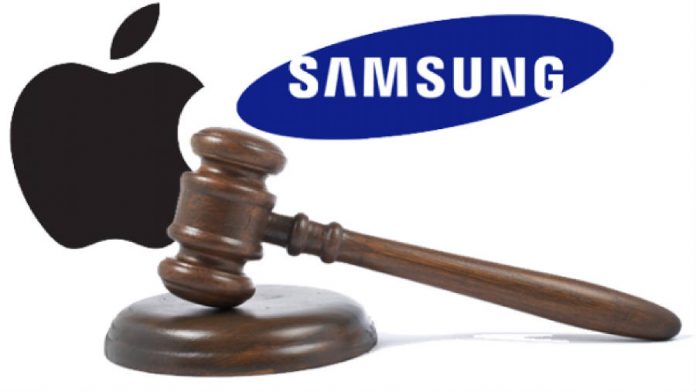
Last Friday, Apple (NASDAQ: AAPL) urged the U.S. Supreme Court to make the final ruling regarding the Apple Inc. vs Samsung Electronics Co., Ltd. smartphone design patents case. The iPhone maker wants to claim hundreds of millions in damages from Samsung. The court will reach a verdict on October 11.
South Korean electronics Samsung and California-based Apple, the two top smartphone manufacturers in the world, have been fighting a patent battle in court since 2011 when the iPhone company accused Samsung of copying its designs. Apple even tried to ban the sales of eight Samsung phones in the United States without success.
Steve Jobs’s company has had famous feuds with different tech giants including Nokia, Google, and Microsoft.
Apple wants the Supreme Court to nail Samsung
Through a legal brief on Friday, Apple said that Samsung didn’t provide any solid evidence to support its argument that design patents should protect one component of a smartphone, rather than the entire product as the iPhone maker demands.
In consequence, Apple claimed that there is no reason for the U.S. Supreme Court to allow Samsung to make additional arguments, and much less sent the case back to a lower court for further proceedings.
The Californian company further argued that, under the Congress’ patent system, such cases should be resolved taking into account the device in question as one single patent and not considering parts of the device as separate patents.
#USSupremeCourt agrees to hear #Apple – #Samsung #patentFight | #legal #iphone #google #facebook #rewardInnovationhttps://t.co/z2vPN2kFLm
— onestopbrokers (@onestopbrokers) March 22, 2016
But while Apple wants the cold case finally closed, Samsung has been very silent with representatives declining to provide any comment on the matter. According to the Korean company, a ruling favoring Apple would directly reduce innovation and negatively impact the smartphone business.
Apple has a lot of experience in the courtroom
Apple’s lawyers have taken the same approach against Samsung as with previous cases versus Motorola Mobility, High Tech Computer Corp. (HTC), and other smartphone makers that use Google’s Android operating system.
“Samsung cobbles together out-of-context citations to out-of-record materials in an attempt to paint itself as a thought leader in the smartphone industry. But the real record—as played out in the actual marketplace and in this litigation—tells a very different story. Apple innovated; Samsung copied,” the lawyers wrote in the legal brief.
Apple’s co-founder and former CEO Steve Jobs labeled Android a copy of his company’s software design and accused Google of stealing the product. He famously vowed to spend his remaining days and Apple’s $40 billion in the bank trying “to destroy Android”.
His particular legal crusade, however, didn’t prevent Samsung from overtaking Apple in 2015 as the biggest player in the smartphone market.
Samsung accused Apple of fabricating false evidence
The case has its origins in January 2007, when days before the first iPhone was unveiled to the world, Apple filed four design patents to protect the basic shape of its debuting smartphone. Apple further filed patents for its trademarks, user interface, and style.
In 2011, based on these filings, Apple sued Samsung on intellectual property grounds alleging that many of Samsung’s Android phones and tablets used its patents without permission. The lawsuit included claims for patent infringement, false designation of origin, unfair competition, trademark infringement, and unjust enrichment. The targeted Samsung devices included the Nexus S, Epic 4G, Galaxy S 4G, and the Samsung Galaxy Tab.
Apple’s evidence submitted to the court included side-by-side image comparisons of the iPhone 3GS and i9000 Galaxy S to show the alleged similarities. The images, however, were later discovered to have been tampered to make both devices seem more similar, with Samsung accusing Apple of fabricating false evidence.

Then, Samsung countersued Apple in the US, South Korea, Japan, Germany, and the UK accusing Apple of patent infringement for mobile-communications technologies. Samsung won the cases in South Korea, Japan, and the UK. The two smartphone giants eventually reached a settlement agreement in 2014 and dropped all patent disputes outside the United States.
Samsung had to pay $548 million for copyright infringement
Legal disputes continued in the US, though, where Apple came out on top in 2012. A jury ordered Samsung to pay Apple $1 billion in damages for copying parts of Apple’s iPhone and iPad design. Samsung reduced that figure to $548 million, of which $399 million are related to design patents, through several appeals.
Samsung paid the $548 million to Apple in December 2015 but asked the Supreme Court to review the case as the damages awarded were still excessive. Samsung knows that if the damages are reversed the company could rightfully reclaim that money according to its agreement with Apple.
Last month, the U.S. Department of Justice then stepped in and advised that the case should return to a lower court.
Apple responded with the brief indicating that the company has had enough of Samsung’s multiple appeals, which have led nowhere for the South Korean company as it couldn’t prove their point in court and should finally pay up.
On October 11, the US Supreme Court will hear oral arguments in Apple v. Samsung, the first case before the court that involves a claim for design patent infringement, to reach a verdict and put an end to it once and for all. The court only has left to decide whether Apple should be awarded Samsung’s total profit from the sales of the products found to infringe its patents. But if the court rules in Samsung’s favor, Apple would have to return the $548 million that Samsung already paid.
Source: Reuters










